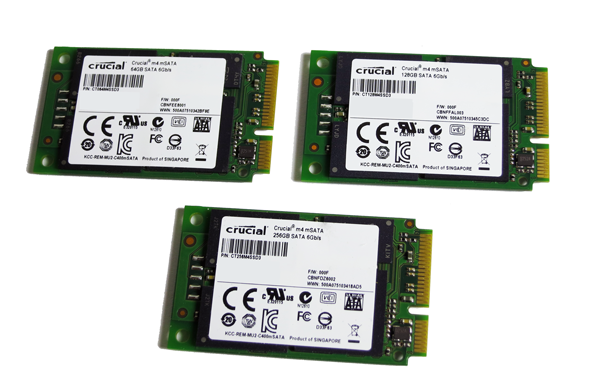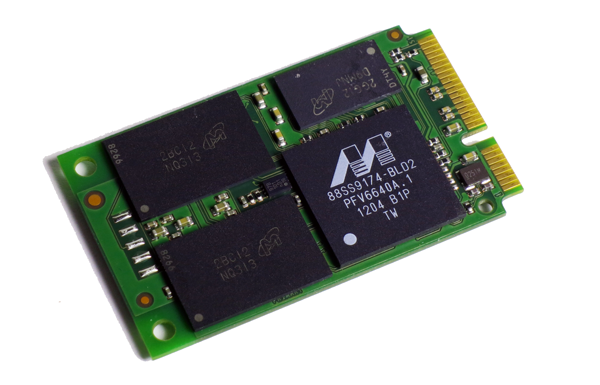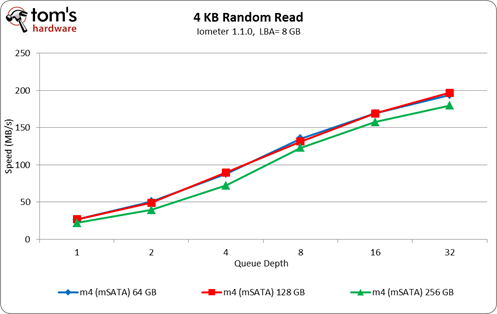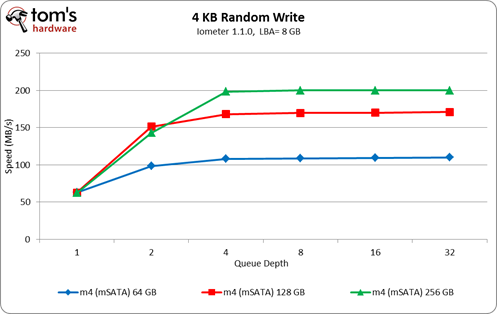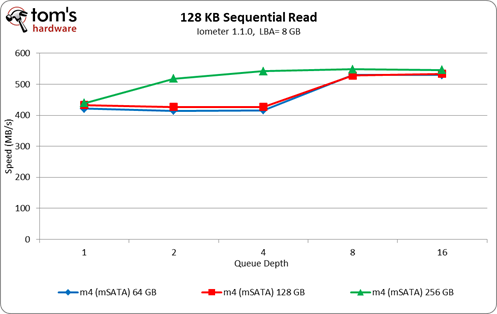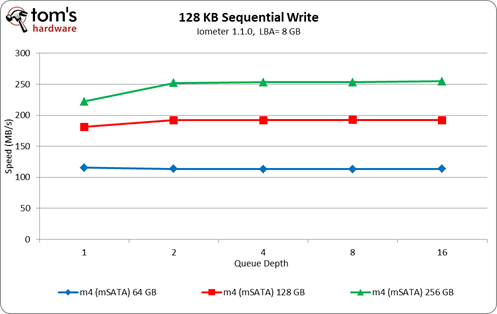Round-Up: 10 mSATA SSDs From Adata, Crucial, Mushkin, And OCZ
Crucial m4 mSATA SSDs
Crucial's nomenclature suggests that we're dealing with a pared-down version of the company's 2.5" m4. The mSATA-based family is available in 32, 64, 128, and 256 GB capacities, though we're only testing the three largest models today, and probably wouldn't recommend bothering with a 32 GB drive anyway. That's barely large enough for a 64-bit Windows 7 or 8 installation, which eats up more than 20 GB on its own.
Crucial's m4s with mSATA interfaces employ the same eight-channel Marvell 88SS9174 controller found on the company's older and more familiar 2.5" models. The company also uses the same 25 nm NAND from IMFT. As you can see, though, there is only room for four BGA memory packages on the diminutive PCB. So, some of the same interleaving issues that affected Adata's XPG SX300 drives are bound to surface when we compare lower-capacity drives to the larger models with more flash.
Random read performance is consistent from a queue depth of one all the way through 32, with the 256 GB m4 trailing just slightly. This is in contrast to what we saw from Adata's drives, which were clearly differentiated by the time we hit higher queue depths.
Without the benefit of DuraWrite, a SandForce-only technology, Crucial's m4s behave a lot like Adata's XPG SX300s faced with incompressible data. They all turn in similar numbers at a queue depth of one in our 4 KB random write test. At a queue depth of two, the 128 and 256 GB models stand apart from the 64 GB drive. And by the time we push a queue depth of four, the 256 GB sits atop Crucial's stack.
It takes a queue depth higher than four for the 64 and 128 GB m4s to catch up to Crucial's 256 GB model, though, at several other points in the chart, all drives perform similarly in our 128 KB sequential read test.
DuraWrite helped Adata's XPG SX300s maintain comparable transfer rates in our 128 KB sequential write benchmark, so long as data was compressible. As soon as the SandForce-powered SSDs were faced with incompressible data, however, we saw clear differences between each capacity level.
It doesn't matter what type of data you throw at Marvell's controller; the m4s don't exhibit that dualistic behavior typical of SandForce-based competition. But right out of the gate we see the 64 GB m4 achieving less than half as much throughput as the 256 GB model, with 128 GB between them.
Get Tom's Hardware's best news and in-depth reviews, straight to your inbox.
Current page: Crucial m4 mSATA SSDs
Prev Page Adata XPG SX300 mSATA SSDs Next Page Mushkin Enhanced Atlas mSATA SSDs-
trumpeter1994 I just got a 256GB Crucial m4 msata SSD for the laptop I'm typing from. I love the thing its so nice to have in my y580Reply -
weatherdude Nice to see mSATA SSD's performing so well. Looks like laptops can now benefit from SSD's without having to compromise on storage space by giving up HDD's.Reply
Also the award is something new. I guess the "Recommended" and "Approved" awards are gone for 2013? -
cangelini weatherdudeNice to see mSATA SSD's performing so well. Looks like laptops can now benefit from SSD's without having to compromise on storage space by giving up HDD's.Also the award is something new. I guess the "Recommended" and "Approved" awards are gone for 2013?Approved is still one of the awards we're using. Recommended Buy is replaced by Smart Buy to better-convey the emphasis on value, and Best Of is replaced by Elite to better convey the emphasis on "this is the best damn product in the segment that we can recommend." Elites will continue to be something you rarely ever see, except when we want to make a point to honor a piece of hardware.Reply -
abbadon_34 Seems kinda underwhelming, seeing only 4 in the market, 2 of them years old. Ironically puts Intel's SSD and OCZ's in the same boat.Reply -
tsnor Excellent article. Nice. Much better than typical.Reply
Some discussion of trim, and the effects of using drives with a few days of use would have been good. The assumption is that the 'clean drive' performance tested is a good indicator of what people will see when they've used the drive for a month needs to be tested, the perforamnce order might change sharply. A 6 hour random write workload would go a long way to showing what to expect. Especially given the broken TRIM on SF 5 firmware and the slow speed of the fixes to existing SF drives. -
jaquith Yep, no argument the Crucial m4 mSATA 256 GB stole the show. It's both the fastest & cheapest -- what's the catch? I hope none.Reply
BTW - $179.99 or $0.70/GB (Promo Code: EMCYTZT2757) NewEgg - http://www.newegg.com/Product/Product.aspx?Item=N82E16820148613 Just noticed the sale from a NewEgg email. -
Onus I've got a 256GB Crucial M4 in the little clip on my Maximus V Gene as the boot drive. It's been performing flawlessly there for months.Reply
That's a bit crazy I know, but I had originally had it on the underside of an AZRock Z77E-ITX board until that board died. -
sna May I ask why is the Samsung 830 msata drive not present in this review?Reply
as I recall it outperforms the M4 and all the drives here.
-
edlivian oh great, now newegg and crucial are going to jack up the prices on the m4 line.Reply
I love the m4 drives, but now its going to get too much attention. -
jacobdrj snaMay I ask why is the Samsung 830 msata drive not present in this review?as I recall it outperforms the M4 and all the drives here.Because they are pretty much EOL with the 840 series out.Reply
I want to know when AMD laptops are going to start including msata slots... It is the budget laptop guys that would get the best benefit from msata with a standard HDD together...
